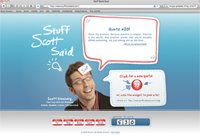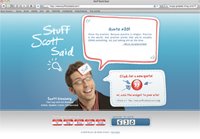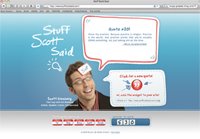 If you’re under the age of thirty-five, the default posture of the world is not to believe you.
If you’re under the age of thirty-five, the default posture of the world is not to believe you.
I know. Total bummer.
But it’s not your fault – it’s just human nature. Age equals credibility. And there’s no way to speed it up.
Actually, I take that back. My friend Tom Reilly once suggested: “If you want people to take you seriously, either go grey or vacate.”
Not a bad idea. Certainly worked for Taylor Hicks.
But outside of follicular augmentation, the smartest move for a young leader is to position her attitudes, behaviors and language in a consistent manner that shows the world she’s serious. That shows the world she’s not messing around.
Whether you’re a budding entrepreneur, entry-level employee, college intern or new kid on the block, consider these suggestions:1. Beware of the copycats. Commitment is an easily confusable entity. And if you don’t learn to discern the difference between commitment and its cheap imitations, everything you do will be like winking in the dark. Honestly ask yourself these questions:
Are you truly committed – or just curious?
Are you truly committed – or just involved?
Are you truly committed – or just concerned?
Are you truly committed – or just interested?
Are you truly committed – or just legally obligated?
Are you truly committed – or just not unhappy enough to change?
Are you truly committed – or just biding your time until something better comes along?
Approach these questions as a personal audit. Use them as an accountability tool to sustain your level commitment. And if you think it sounds like a lot of work, you’re wrong.
It’s not a lot of work – it’s a ton of work. But that’s the whole point: The reason commitment costs so much is because it pays so well. Are you willing to make the investment?
2. Choose ubiquitous over anonymous. If attention is currency, anonymity is bankruptcy. Which brings us to the central question: Are you everywhere? If so, the world already knows you’re serious.
If not, here’s my suggestion: Approach everything you do as a form of marketing. In 2001, a survey conducted by The Washington Post that indicated the following:
“Self-employed businesspeople spend an average of forty-three minutes a day marketing themselves.”
If you do the math, that’s eight percent of your entire day. Which leads to my next question: What the hell are people doing for the other four hundred and thirty minutes?
Answer: The wrong things.
Here’s the reality: Marketing is everything and everything is marketing. The challenge to twofold. First, to change your definition of marketing to “transferring emotion.” That’s it.
And second, to find a way to (respectfully) transform everything you do into some form of marketing. Emails. Phone calls. Meetings. Blog posts. Everything.
Remember: People who only do marketing “here and there,” will only get new business here and there. How many minutes did you spend on marketing yesterday?
3. Ship only great work out the door. Piano man Ben Folds reminds us in the song One Down, “People tell me to just make up junk and turn it in. But I was never okay with turning in a bunch of crap. And I don’t like wasting time on music that won’t make me proud.”
Sadly, many of my colleagues fall victim to that trap. They publish average books with average content. They give unremarkable speeches with unremarkable slides. They write boring blog posts using boring examples.
And it’s not like they’re going broke – they’re just not going for broke. That’s the next way to show the world you’re serious: By refusing to execute mediocrity. Because without making this baseline decision, without setting this standard of excellence, you leave yourself vulnerable to attack. And the sexiness of average will seduce you like six-foot blonde in a black dress.
Remember: Being amazing isn’t enough. The other half of the equation is the willingness to wage a war against mediocrity. Burn the beige. Vaporize the vanilla. Banish the bland. Nuke the normal. Murder the average. Are you giving the future something to rah-spect?
4. Consistency is the ultimate commitment device. Every time I find a blog that hasn’t posted since the Clinton Administration, a small part of me dies inside. Seriously: If you’re not going to stay up with it, don’t bother. Something isn’t always better than nothing.
If you want people to take you seriously, remember my personal mantra: “Consistency is far better than rare moments of greatness.” Whether you’re publishing online content, leading a Wednesday night bible study, interning at your dream job or trying to be a better parent, consistency is not an accident.
It’s a sequence of intentionally consistent, similar actions. It’s a timeline of credibility. Personally, I wear a nametag everyday. Plus I got one tattooed on my chest. Plus I post a “number of consecutive days” counter on my website. Those are my commitment devices. What are yours?
Because if you want to win, you can’t just commit – you have to communicate to the people who matter most that you’re fully committed. Remember: Commitment without evidence is pantomime. How will you reinforce your positive pattern of execution?
5. Consider what affects your ability to be taken seriously. In Napoleon Hill’s classic work, The Laws of Success, he writes that the world will forgive you if you make mistakes – but it will never forgive you if you make no decisions. That’s the secret: To achieve definiteness of decision.
Interestingly, the word “decision” comes from the Latin decisio, or “agreement.” Which means it’s a function of values. Which means you gave it serious thought. And which means it’s a part your core.
The challenge (according to many of my clients) is actually pulling the trigger. Overcoming the paralyzing uncertainty of taking that crucial first step. And that’s why I suggest the following: Violently refuse to get snared into an endless tangle of anxiety, regret and second-guessing.
You can’t go through life regretting every decision you make just because it might not have been the best possible one. It’ll eat you up inside like a tapeworm.
Shakespeare was right: Delays have dangerous ends. Ginsberg was right too: Reluctance to make a decision is a form of resistance.
And the bottom line is: People won’t take you seriously if they’re too busy questioning your decision-making ability. It’s time to put a stake in the ground. What are you unconsciously doing that’s marring your credibility?
6. Real commitment is unthwartable by circumstance. As a musician, I learned a long time ago that it doesn’t matter if you break a string – it matters how quickly you return to the music.
This same principle of stick-to-itiveness applies to the song of life. If you want to show people you’re serious, try not walking away from the eyes of the world when they roll at you. Instead of acquiescing to your circumstances, yield to your core. Use your values as navigators.
When things go wrong, when people lash out at you, or when you screw the pooch in public, ask yourself, “If I were me, what would I do in this situation?” Doing so will initiate an instant calming sequence that draws people to you.
After all, in times of crisis, people turn to people who are calm. Calm is what builds trust, mitigates stress, remedies confusion and inspires followership. And it’s the perfect way to show the world you’re serious.
As long as you remember: There’s a direct correlation between the ability to make a name for yourself and the willingness to make an idiot of yourself. Are you impervious to embarrassment?
In conclusion, we remember to the immortal words of Bill Cosby:
“Anyone can dabble, but once you’ve made that commitment, your blood has that particular thing in it, and it’s very hard for people to stop you.”
JUST REMEMBER: Commitment isn’t just an obligation – it’s a demonstration.
It’s a constant exertion of your values.
It’s a consistent extension of your truth.
It’s a consummate expression of your core.
That’s how you show the world you’re serious.
And the best part is: When you do, your commitment doesn’t just become noticeable – it becomes billable.
LET ME ASK YA THIS…
Are you prepared to turn your desire into your obsession?
LET ME SUGGEST THIS…
For the list called, “65 Things I Wish Somebody Would Have Told Me When I Started My Company,” send an email to me, and you win the list for free!
* * * *
Scott Ginsberg
That Guy with the Nametag
Author, Speaker, Entrepreneur, Mentor
[email protected]
Now booking for 2011!
Watch The Nametag Guy in action here!


 Stick-to-itiveness can be learned.
Stick-to-itiveness can be learned. Who’s quoting YOU?
Who’s quoting YOU? Stick-to-itiveness can be learned.
Stick-to-itiveness can be learned. Who’s quoting YOU?
Who’s quoting YOU? Stick-to-itiveness can be learned.
Stick-to-itiveness can be learned. Who’s quoting YOU?
Who’s quoting YOU?